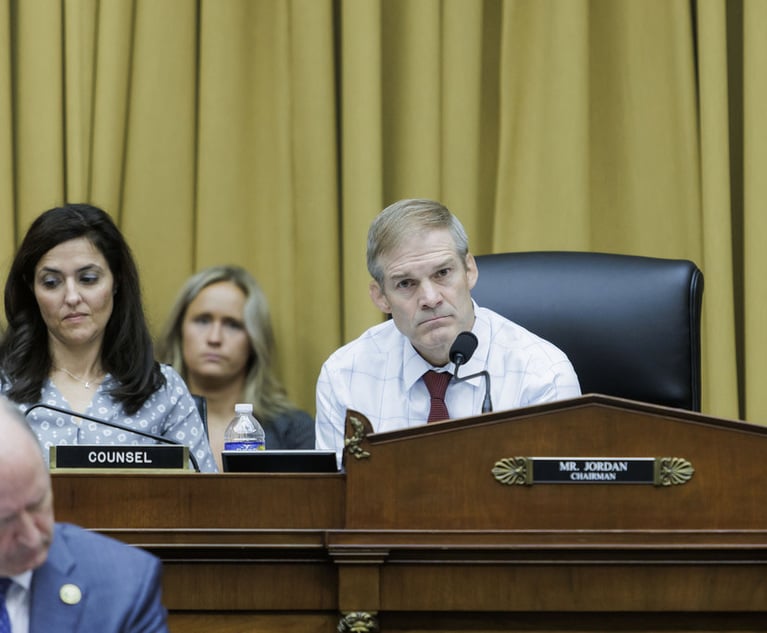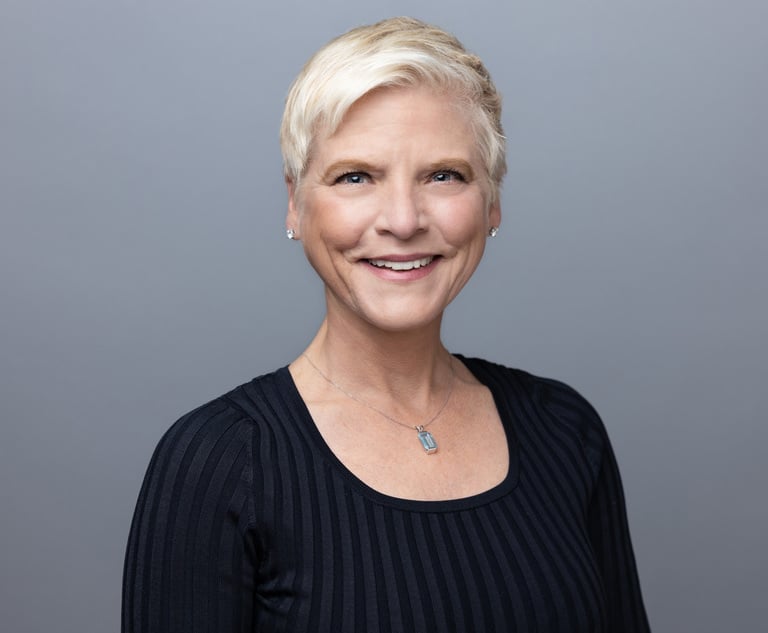Law Firm With Litigation Finance Ties Takes on Opioid Crisis
After selling their litigation funding business to Burford Capital Ltd., the founders of Gerchen Keller Capital launched their own plaintiffs firm earlier this year. Now that new firm is taking aim at its first defendants.
May 07, 2018 at 05:37 PM
5 minute read
 Travis Lenkner.
Travis Lenkner.
As founders of one of the first and biggest litigation funding companies, the trio behind what was once Gerchen Keller Capital (GKC) became known for bringing financial innovation to a staid profession's books.
Now, they're taking on the opioid crisis by putting a new twist on an en vogue type of litigation: Suing manufacturers and distributors for allegedly causing higher insurance premiums.
Adam Gerchen, Ashley Keller and Travis Lenkner quietly launched Keller Lenkner, a plaintiff-side litigation firm, earlier this year following their departure from daily operations at Burford Capital Ltd., which purchased GKC for $160 million in late 2016.
Last week, Keller Lenkner was listed as counsel on five class action suits that seek to hold opioid manufacturers liable for the increased cost of private health insurance caused by opioids and the misleading marketing that makers of such drugs allegedly engaged in, all of which is part of a national addiction crisis that the suits claim has caused more than 350,000 deaths since 1999.
Opioid makers are now facing a deluge of litigation. Cities, counties across the country and numerous Native American tribes have filed some 400 suits against manufacturers of drugs such as OxyContin, as well as drug distributors and pharmacies.
Lenkner said the suits his firm filed last week represent the first to seek damages from the epidemic's alleged impact on private insurance premiums. The suits name 18 corporate defendants ranging from some of the largest pharmaceutical companies to drug distribution giants.
The complaints, filed in California, Illinois, Massachusetts, New Jersey and New York, assert that private insurance claims rose 3,200 percent nationwide between 2007 and 2014, and that in 2015 the cost of care for insured patients with opioid dependency was 550 percent higher than for the average insured patient.
“The economic harm created by the opioid epidemic is not limited to the government,” Lenkner said. “And study upon study shows very large numbers—in the billions of dollars—of annual costs to private health insurance and privately paid health care as a result of the epidemic.”
Keller Lenkner is joined in the suits by national co-counsel from two other firms: The well-known, Chicago-based class action firm Edelson and Consovoy McCarthy Park, a litigation boutique co-founded in 2014 by two former Wiley Rein partners.
Lenkner would not comment on whether his firm is using a litigation funder or some other financing vehicle to back the cases. He said that the three founders of GKC were the equity partners in Keller Lenkner, and that, like other plaintiff firms, they would not comment on how they finance their business.
Judges have largely avoided requiring the disclosure of third-party litigation finance deals, although last month the U.S. Chamber of Commerce successfully backed a groundbreaking Wisconsin law requiring such disclosures.
On Monday, in the multidistrict litigation overseeing more than 600 opioid complaints across the country, U.S. District Judge Dan Polster in Cleveland ordered any plaintiffs with third-party litigation finance deals to submit to his chambers a description of the deals.
Polster said the lawyers and their financiers must attest that the deals do not create a conflict of interest or “give to the lender any control over litigation strategy or settlement decisions.” He noted that any nonconforming deals would be deemed unenforceable and could lead to sanctions. Polster also said he would not allow discovery by defendants into the deals “absent extraordinary circumstances.”
Litigation funders have long said their agreements do not grant them any control over settlement decisions.
Lenkner said their firm specifically represents plaintiffs in large, complex litigation where there are “significant damages” at stake.
“These cases have all of those hallmarks,” Lenkner said. “And that's the sort of thing you'll see from us going forward.”
➤➤ Want more reporting on the evolving legal industry? Sign up here for The Law Firm Disrupted by Roy Strom. Each week, Roy offers a levelheaded discussion of trends rocking the legal sector, examines how industry leaders are coping (or not) and offers insight on the tactics and strategies of would-be disrupters.
This content has been archived. It is available through our partners, LexisNexis® and Bloomberg Law.
To view this content, please continue to their sites.
Not a Lexis Subscriber?
Subscribe Now
Not a Bloomberg Law Subscriber?
Subscribe Now
NOT FOR REPRINT
© 2024 ALM Global, LLC, All Rights Reserved. Request academic re-use from www.copyright.com. All other uses, submit a request to [email protected]. For more information visit Asset & Logo Licensing.
You Might Like
View All
Freshfields Hires DOJ Official, Squire Taps Paul Hastings Atty for US Antitrust Head
3 minute read

How Big Law Congressional Investigation Practices Will Stay Busy in 2025
5 minute read
Trending Stories
- 1Elon Musk Names Microsoft, Calif. AG to Amended OpenAI Suit
- 2Trump’s Plan to Purge Democracy
- 3Baltimore City Govt., After Winning Opioid Jury Trial, Preparing to Demand an Additional $11B for Abatement Costs
- 4X Joins Legal Attack on California's New Deepfakes Law
- 5Monsanto Wins Latest Philadelphia Roundup Trial
Who Got The Work
Michael G. Bongiorno, Andrew Scott Dulberg and Elizabeth E. Driscoll from Wilmer Cutler Pickering Hale and Dorr have stepped in to represent Symbotic Inc., an A.I.-enabled technology platform that focuses on increasing supply chain efficiency, and other defendants in a pending shareholder derivative lawsuit. The case, filed Oct. 2 in Massachusetts District Court by the Brown Law Firm on behalf of Stephen Austen, accuses certain officers and directors of misleading investors in regard to Symbotic's potential for margin growth by failing to disclose that the company was not equipped to timely deploy its systems or manage expenses through project delays. The case, assigned to U.S. District Judge Nathaniel M. Gorton, is 1:24-cv-12522, Austen v. Cohen et al.
Who Got The Work
Edmund Polubinski and Marie Killmond of Davis Polk & Wardwell have entered appearances for data platform software development company MongoDB and other defendants in a pending shareholder derivative lawsuit. The action, filed Oct. 7 in New York Southern District Court by the Brown Law Firm, accuses the company's directors and/or officers of falsely expressing confidence in the company’s restructuring of its sales incentive plan and downplaying the severity of decreases in its upfront commitments. The case is 1:24-cv-07594, Roy v. Ittycheria et al.
Who Got The Work
Amy O. Bruchs and Kurt F. Ellison of Michael Best & Friedrich have entered appearances for Epic Systems Corp. in a pending employment discrimination lawsuit. The suit was filed Sept. 7 in Wisconsin Western District Court by Levine Eisberner LLC and Siri & Glimstad on behalf of a project manager who claims that he was wrongfully terminated after applying for a religious exemption to the defendant's COVID-19 vaccine mandate. The case, assigned to U.S. Magistrate Judge Anita Marie Boor, is 3:24-cv-00630, Secker, Nathan v. Epic Systems Corporation.
Who Got The Work
David X. Sullivan, Thomas J. Finn and Gregory A. Hall from McCarter & English have entered appearances for Sunrun Installation Services in a pending civil rights lawsuit. The complaint was filed Sept. 4 in Connecticut District Court by attorney Robert M. Berke on behalf of former employee George Edward Steins, who was arrested and charged with employing an unregistered home improvement salesperson. The complaint alleges that had Sunrun informed the Connecticut Department of Consumer Protection that the plaintiff's employment had ended in 2017 and that he no longer held Sunrun's home improvement contractor license, he would not have been hit with charges, which were dismissed in May 2024. The case, assigned to U.S. District Judge Jeffrey A. Meyer, is 3:24-cv-01423, Steins v. Sunrun, Inc. et al.
Who Got The Work
Greenberg Traurig shareholder Joshua L. Raskin has entered an appearance for boohoo.com UK Ltd. in a pending patent infringement lawsuit. The suit, filed Sept. 3 in Texas Eastern District Court by Rozier Hardt McDonough on behalf of Alto Dynamics, asserts five patents related to an online shopping platform. The case, assigned to U.S. District Judge Rodney Gilstrap, is 2:24-cv-00719, Alto Dynamics, LLC v. boohoo.com UK Limited.
Featured Firms
Law Offices of Gary Martin Hays & Associates, P.C.
(470) 294-1674
Law Offices of Mark E. Salomone
(857) 444-6468
Smith & Hassler
(713) 739-1250










